Major automakers plan to roll out hundreds of new electric vehicle models over the next several years, fueled by investments that consultancy AlixPartners has estimated at up to $255 billion through 2023. To put that in context, in 2017 all the world’s automakers and suppliers combined invested $115 billion in research and development, and had capital expenditures of $234 billion.
Much of that investment will flow to suppliers, but only if they can offer ways to cut electric vehicle manufacturing costs, which are still higher than for internal combustion cars. Automotive technology companies are looking for ways to adapt to electric vehicles existing products that enjoy economies of scale from other markets, according to Reuters.
Suppliers hope automakers will adopt their technology early in the development process so they can sell similar products to more than one customer. “Eventually we’ll see more standardization in the high-voltage market, but it’s not there yet,” said Alan Amici, vice president of transportation solutions for TE Connectivity Ltd (TEL.N).
That’s why TE and other suppliers are using embedded teams of engineers within the engineering operations of major automaker customers. From inside, suppliers can pitch existing products and materials, or ones they have in development. Their customers are looking for ways to get more driving miles per charge, tackle technical problems such as electromagnetic interference or, most importantly, cut costs on vehicles that are as yet unprofitable.
